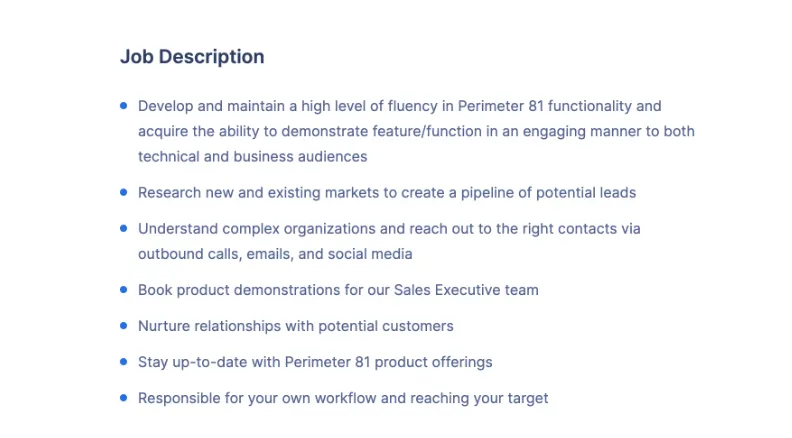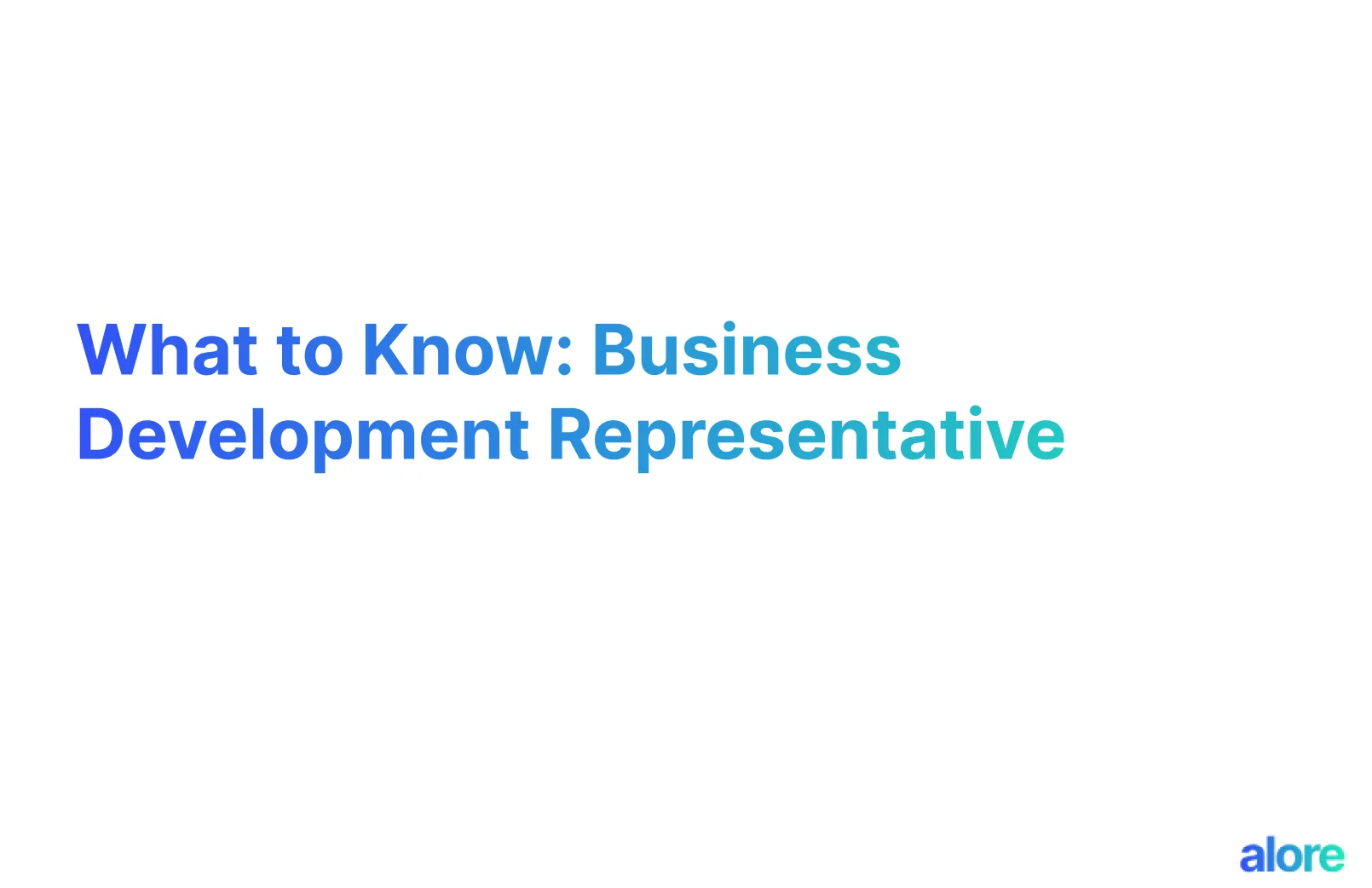What Is a Business Development Representative (BDR)?
A Business Development Representative (BDR) is a specialized sales role focused on generating new business opportunities. Their main task is to find and engage potential customers, laying the groundwork for future sales.
Business Development Representative plays a pivotal role in driving business growth, from lead generation to closing deals. Their expertise in understanding the sales process, combined with their ability to identify and nurture new business opportunities, makes them invaluable assets.
Why is the Business Development Representative Role such an important role
BDR's role is crucial due to its direct impact on a company. Here's why:
- Sales Process and Growth:
- BDRs are instrumental in driving sales and achieving sales quotas.
- They play a vital role in converting potential buyers into loyal customers.
- Brand and Market Alignment:
- Acting as the company's front-line representatives, BDRs help in building customer profiles and understanding client needs.
- They also play a part in shaping the job description for future business development roles.
- Strategic Business Contributions:
- Beyond immediate sales goals, BDRs contribute to long-term strategies for business success.
- They are involved in various aspects, from cold calling to engaging in marketing campaigns, all aimed at nurturing potential customers into successful conversions.
The Role of BDRs in Sales Teams and Organization Growth
BDRs responsibilities include not just to create a lead, but to ensure that the lead is viable and align with the company’s goals
Here’s how they contribute:
Lead Qualification: BDRs filter and qualify leads, ensuring that the sales team focuses on prospects with the highest conversion potential.
Sales Process Enhancement: By continuously analyzing and improving the sales process, BDRs help streamline sales efforts.
Market Research: They keep abreast of trends and customer profiles, which is crucial for tailoring marketing campaigns and sales strategies.
Building Relationships: BDRs lay the groundwork for long-term customer relationships, starting from the initial contact.
Why Business Development Representatives Are Key to Business Growth
A BDR Person engages in strategic analysis of industries, identifying potential customers, and laying the groundwork for sustainable expansion of an organization
BDRs are Responsible for Generating More Qualified Leads
Business Development Representatives (BDRs) are crucial in identifying and nurturing qualified leads, a key element in their job. Their job involves:
Strategic Prospecting: Pinpoint potential clients whose needs align with the company’s offerings.
Engage Communication: Through direct methods like cold calling and networking, they engage with potential buyers, creating a pathway for future sales.
Lead Assessment: Evaluating leads to ensure they meet specific criteria for quality and potential ROI.
BDRs Have a Major Impact on Sales Process and Sales Opportunities
BDRs significantly influence the sales process and uncover new business opportunities for an Organization
They:
Streamline Sales: By refining the sales process, they create it more effective and tailored to potential clients.
Market Analysis: Constantly analyzing trends to identify emerging business opportunities.
Sales Team Support: Acting as a vital link between the sales team and potential customers, ensuring that the sales teams are equipped with pertinent information about prospects.
BDRs Contribute to Sales Pipeline and Meeting Sales Quotas
BDRs are instrumental in building and maintaining a robust sales pipeline, crucial for meeting and exceeding sales quotas. Their contributions include:
Lead Generation: Consistently adding new, qualifying leads into the sales pipeline.
Sales Enablement: Providing the sales team with insights and tools necessary for closing deals.
Performance Tracking: Monitoring the sales process to identify areas for improvement and ensure alignment with sales quotas.
By maintaining a healthy sales pipeline, BDRs directly impact the sales team’s ability to meet their targets
Importance of Crafting Marketing Campaigns for Business Expansion
BDRs contact the marketing team to craft targeted marketing campaigns. Their industry insights ensure that campaigns resonate with the intended audience, contributing to business expansion, and hence leading to success. Key elements include:
Targeted Messaging: Aligning the campaign’s message with the audience's specific needs and interests.
Utilizing Digital Platforms: Leveraging social selling and online marketing tools to maximize reach and impact.
Business Development Rep vs. Sales Rep: Importance of Both Roles in a Sales Team
Who Are Sales Reps (SDRs)?
Sales Development Representatives (SDRs) primarily focused on outbound prospecting. Their main task is to reach out to potential clients, gauge their interest in the product or service, and develop these leads for the sales pipeline.
SDRs are experts in direct communication, often using tools like cold calls and networking to engage with prospects. They have a deep understanding of customer profiles, allowing them to tailor their approach effectively.
Comparing BDR and SDR Contributions to Lead Management

In lead management, Business Development Representatives (BDRs) and SDRs have distinct roles:
- BDRs: They concentrate on generating and qualifying leads, leveraging tools like CRM software to identify new business opportunities.
- SDRs: Once leads are identified by BDRs, SDRs take charge. They focus on customer interaction and aim to convert leads into sales, contributing directly to meeting sales quotas.
How Business Development Reps Facilitate Business Growth
Driving New Business Opportunities: A BDR's Job
A Business Development Representative (BDR) drives a Company to success in the following ways
Market Analysis
BDRs analyze industry trends and customer data to identify areas ripe for expansion and prospective Audiences. This often involves exploring untapped sectors or new geographical locations.
Lead Generation
Through strategies like cold calls, networking, and cold email, BDRs engage with potential buyers, aiming to turn them into qualified leads. They focus on inbound leads that have a high potential for conversion, contributing significantly to the sales pipeline.
Utilize Connection & Network
To expand their reach, BDRs often utilize job boards and networking events. These platforms provide insights into potential industries and opportunities for partnerships or new client acquisitions.
Craft Targeted Marketing Campaigns
With their industry insights, BDRs aid in developing targeted marketing campaigns. They work closely with the marketing team to ensure campaigns are tailored to attract the right audience, increasing the chance of conversion.
Supporting Sales Goals
By generating more qualified leads, BDRs play a vital role in helping the sales team meet and exceed sales quotas. Their work ensures that the sales pipeline is filled with high-potential leads and it leads to revenue for the company
Technology Utilization
Utilizing CRM software, BDRs track and manage customer interactions, ensuring a structured approach to lead management. This technological edge is responsible for maintaining a steady flow of new opportunities.
How to Get a Job as a Business Development Representative
Understand the Business Development Representative Job Description
To get Hire as a Business development representative, understand the job description on job boards

A Business Development Representative job role is motivated by creating new sales opportunities.
The role has certain responsibilities and requires a strategic approach, balancing between prospecting new clients and understanding their specific requirements to guide them effectively through the sales process for the deal
Qualifications and Skills Needed to Landup as Business Development Rep
To get hire for a Business Development Representative job Role, certain qualifications and skills are crucial:
- Educational Background: A degree in business, marketing, or a related field is often preferred. However, companies also value diverse educational backgrounds coupled with relevant skills.
- Sales Skills: A person should be motivated for sales and should have proficiency in sales techniques, including cold calls and social selling, which is essential. A BDR should be skilled in engaging potential customers and guiding them through the sales pipeline.
- Communication and Interpersonal Skills: Excellent verbal and written communication skills are critical. A BDR must articulate the value proposition effectively and build rapport with diverse clients.
- CRM Proficiency: Familiarity with CRM software is important for tracking interactions and managing customer information efficiently.
- Analytical Skills: The ability to analyze industry trends and customer data to identify new opportunities is vital.
- Adaptability and Learning Ability: The business landscape is constantly evolving. A successful BDR must be adaptable and continually update their knowledge and skills.
The Importance of Communication Skills in Business Development Career
Effective communication skills enable Business Development Representative (BDR) to:
- Build Relationships: Effective communication is crucial for establishing and maintaining strong relationships with clients, employees, and stakeholders over the phone, face-to-face, or any networking events
- Understand Needs: It allows BDRs to accurately assess and respond to client needs, ensuring that solutions align with their company requirements.
- Negotiate and Persuade: Strong communication is key in negotiations, helping to persuade and convince potential clients or partners to close the deal





.png)

.png)
